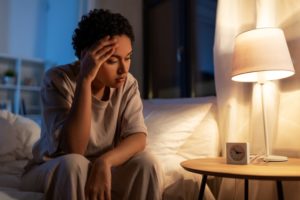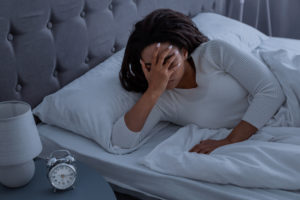Sleep Deprivation and Reaction Time
- Sleep deprivation impairs reaction time, hindering quick responses to stimuli.
- Decreased alertness from lack of sleep poses safety risks, particularly when driving or using machinery.
- Chronic sleep deprivation can have lasting effects on reaction time and cognitive abilities.
The human brain is immensely complex, and a physical reaction to an event can happen in the blink of an eye. Behind the scenes, the brain is working through a series of processes in order to react accordingly.
A person’s reaction time can vary based on a variety of factors. Some factors are outside of their control, such as age, left- or right-handedness, and whether the stimulus is visual or auditory. Other factors that affect reaction times are more within their control, like their level of physical fitness, the presence of distractions, and how much sleep they get each night.
Can a Lack of Sleep Affect Reaction Time?
Getting sufficient sleep is an essential part of both physical and mental health, and not getting enough sleep can affect reaction time. Most adults need between seven and nine hours of sleep per night. Unfortunately, being sleep deprived is fairly common and data suggests around one-third of Americans get less than seven hours of sleep each night .
Reaction times increase as a person accumulates sleep debt . This means that the more sleep a person loses, the longer it takes for them to react to a stimulus. In one study, research subjects were allowed to sleep for five hours per night for a week. Over the course of the week, participants’ reaction times steadily increased as they accumulated sleep debt and felt increasingly sleepy.It is possible that sleep loss increases reaction time due to the body’s simultaneous and competing needs . When a person is sleep deprived, their body is experiencing a need for sleep, a need to stay awake, and a need to perform tasks. These competing drives interfere with their attention from moment to moment, leading to cognitive impairment and an increased reaction time.
The Dangers of an Increased Reaction Time
Reaction times are important in a multitude of professions and activities. Increased reaction times can affect the performance of athletes, as well as the safety and productivity of shift workers, medical professionals, students, pilots, and anyone else whose work requires sustained attention and quick reflexes.Increased reaction times are particularly dangerous when a person gets behind the wheel of a car. An estimated 800 fatalities each year are due to accidents involving drowsy drivers. Driving while sleep deprived can make it more difficult to react quickly to changing road conditions and has been linked to dangerous practices like lane drifting .

How to Test Your Reaction Time
There are several ways to test your reaction time at home. While these methods should not be used to decide if you are too drowsy to drive or do other tasks, they can be an informal way to test your reaction time under different conditions.
The Ruler Test
This simple reaction time test allows you to see how long it takes you to catch a falling ruler. To start, have a friend hold a ruler on the highest measurement. Place your open thumb and forefinger slightly below the ruler, ready to catch it when the ruler falls. Then, have your friend drop the ruler while you catch it between your thumb and forefinger as quickly as possible.
Record the measurement where you caught the ruler. The lower the number, the quicker the ruler was caught and the higher your reaction time. You may want to switch positions with your friend and let them try, then compare your results. You can also compare your reaction time during different conditions, like with or without background noise.
The Psychomotor Vigilance Test
The psychomotor vigilance test (PVT) measures how long it takes to respond to a visual stimulus. Images are shown on an otherwise blank screen at random times and participants are asked to touch a button when they see the image. While this test can be difficult to recreate on your own, there are several computer and smartphone applications that allow you to test your reaction time under different conditions .
Improving Your Reaction Time
Many people want to improve their reaction times to be a safer driver, more productive at work, or quicker at responding in conversations. Others, like new parents, shift workers, and emergency responders, need to maintain quick reaction times under conditions that often require them to miss sleep. While these tips cannot replace a good night’s rest, there are several ways that people can improve their reaction time, both in general and when they have not slept enough.
- Improve hand-eye coordination: Training in hand-eye coordination can improve reaction times and the improvements may stick around long after the training ends. Try picking a sport or activity that involves hand-eye coordination and practicing on a regular basis for the best results.
- Be mindful of alcohol and caffeine use: Alcohol and caffeine have opposite effects on reaction times. Alcohol slows reaction times , even at low levels before a person feels or acts intoxicated. Caffeine, on the other hand, can improve reaction times . While caffeine may help increase reaction time temporarily, keep in mind that it can also interfere with sleep if used too close to bedtime.
- Try meditation or deep breathing: Research suggests that meditation can improve reaction times , even in people who are sleep deprived. Slow, deep breathing has shown similar benefits . Try practicing deep breathing or meditation before activities that require quick reaction times.
- Improve your sleep: Since sleep loss can have such dramatic effects on reaction times, make sure you are getting consistent, quality rest. If you are experiencing sleep issues that are preventing you from getting the rest you need, there are steps you can take to improve your sleep.
Improving Your Sleep
Improving your sleep hygiene is a great first step to feeling more rested and improving your reaction time. Sleep hygiene means incorporating practices that promote better sleep, while reducing practices that are making sleep more challenging.
- Get outside and be active: Getting enough daylight and physical activity are two vital steps in improving sleep hygiene. Both sunlight and exercise help to sync the sleep-wake cycle, an important circadian rhythm.
- Be consistent: Establish a nighttime routine and keep it consistent. Try creating an order for your evening, like showering first, then brushing your teeth, then putting on your pajamas. Following the same routine each night can help your mind and body wind down and know that it is time to sleep.
- Improve your sleep environment: Around 30 to 90 minutes before bed, make sure to turn off or silence all distractions, especially electronics like your TV and smartphone. Find a calming activity to do instead, like stretching, reading, or relaxation exercises.
- Understand the role of diet: Drinking coffee or eating a large meal too late in the evening can disrupt sleep. Alcohol may make it easier to fall asleep initially, but it can disrupt sleep later in the night. Try to limit alcohol and caffeine, especially in the evening.
- Talk to your doctor: If you have persistent difficulties getting enough sleep, it’s important to talk to a medical professional. Doctors, sleep specialists, and mental health counselors are trained to help find and treat issues that affect your sleep.

Still have questions? Ask our community!
Join our Sleep Care Community — a trusted hub of sleep health professionals, product specialists, and people just like you. Whether you need expert sleep advice for your insomnia or you’re searching for the perfect mattress, we’ve got you covered. Get personalized guidance from the experts who know sleep best.
References
10 Sources
-
Liu, Y., Wheaton, A. G., Chapman, D. P., Cunningham, T. J., Lu, H., & Croft, J. B. (2016). Prevalence of healthy sleep duration among adults–United States, 2014. MMWR. Morbidity and mortality weekly report, 65(6), 137–141.
https://pubmed.ncbi.nlm.nih.gov/26890214/ -
Bonnet, M. H., & Arand, D. L. (2003). Clinical effects of sleep fragmentation versus sleep deprivation. Sleep Medicine Reviews, 7(4), 297–310.
https://pubmed.ncbi.nlm.nih.gov/14505597/ -
Tucker, A. M., Whitney, P., Belenky, G., Hinson, J. M., & Van Dongen, H. P. (2010). Effects of sleep deprivation on dissociated components of executive functioning. Sleep, 33(1), 47–57.
https://www.ncbi.nlm.nih.gov/pmc/articles/PMC2656292/ -
National Highway Traffic Safety Administration. (n.d.). Drowsy Driving., Retrieved February 24, 2023, from
https://www.nhtsa.gov/risky-driving/drowsy-driving -
Baulk, S. D., Biggs, S. N., Reid, K. J., van den Heuvel, C. J., & Dawson, D. (2008). Chasing the silver bullet: Measuring driver fatigue using simple and complex tasks. Accident Analysis and Prevention, 40(1), 396–402.
https://linkinghub.elsevier.com/retrieve/pii/S0001457507001200 -
Grant, D. A., Honn, K. A., Layton, M. E., Riedy, S. M., & Van Dongen, H. (2017). 3-minute smartphone-based and tablet-based psychomotor vigilance tests for the assessment of reduced alertness due to sleep deprivation. Behavior research methods, 49(3), 1020–1029.
http://link.springer.com/10.3758/s13428-016-0763-8 -
Hernández, O. H., Vogel-Sprott, M., & Ke-Aznar, V. I. (2007). Alcohol impairs the cognitive component of reaction time to an omitted stimulus: a replication and an extension. Journal of studies on alcohol and drugs, 68(2), 276–281.
https://www.jsad.com/doi/10.15288/jsad.2007.68.276 -
Santos, V. G., Santos, V. R., Felippe, L. J., Almeida, J. W., Jr, Bertuzzi, R., Kiss, M. A., & Lima-Silva, A. E. (2014). Caffeine reduces reaction time and improves performance in simulated-contest of taekwondo. Nutrients, 6(2), 637–649.
https://pubmed.ncbi.nlm.nih.gov/24518826/ -
Kaul, P., Passafiume, J., Sargent, C. R., & O’Hara, B. F. (2010). Meditation acutely improves psychomotor vigilance, and may decrease sleep need. Behavioral and Brain Functions, 6, 47.
https://pubmed.ncbi.nlm.nih.gov/20670413/ -
Manandhar, S. A., & Pramanik, T. (2019). Immediate Effect of Slow Deep Breathing Exercise on Blood Pressure and Reaction Time. Mymensingh Medical Journal, 28(4), 925–929.
https://pubmed.ncbi.nlm.nih.gov/31599262/











